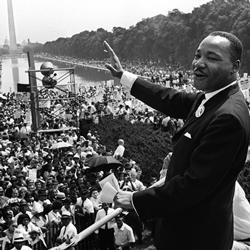|
Created on August 28, 2013 |
Fifty years ago this week, on August 28, 1963, Dr. Martin Luther King, Jr. delivered one of the most consequential speeches in American history. Standing in the shadow of the Lincoln Memorial before nearly a quarter million Americans from nearly every corner of the nation, Dr. King articulated his vision of a more just and equitable America, creating a powerful weapon in his non-violent crusade for civil rights.
His goal was simply stated, easy to understand and remarkably consistent with what he believed throughout his entire life. He wanted social and economic justice for all. In fact, he spoke about justice 11 times in his famous speech, exactly the same number of times he used the word “dream.”
My office, the Minority Business Development Agency, is located directly across the street from the Willard Hotel where Dr. King prepared his notes and rested the night before he spoke. When I look in that direction now, 50 years later, I wonder what might have been going through the minds of those who were there with him on the mall, or those who saw him live on television. Did they realize they were witnessing such an historic moment?
I was too young to remember what happened on that day and I experienced the energy of Dr. King’s speech only through video, pictures and written accounts. But like millions of other Americans over multiple generations, I have been profoundly and permanently affected by the forces of change that Dr. King propelled into action. In fact, I am a direct beneficiary of his vision as are generations yet unborn who will feel the significance of what he accomplished just as surely as those who were there with him on the mall on that pivotal day a half century ago.
On that day, Dr. King thrust the civil rights movement into the national spotlight in a way that it never had been before and motivated a hesitant nation to act, setting in motion a whole series of legislative milestones. The Civil Rights Act of 1964 banned employment discrimination and segregation in public places. It was followed by the Voting Rights Act of 1965 that prohibited voting discrimination and then the Fair Housing Act in 1968. In 1969, the Supreme Court abandoned its 1954 “all deliberate speed” standard and ordered the immediate desegregation of southern schools.
The civil rights movement also ushered in a heightened awareness of supporting economic empowerment through entrepreneurship. In 1969, President Nixon signed an Executive Order that created the Office of Minority Business Enterprise, which later partnered with the U.S. Census Bureau to conduct the first Survey of Minority-Owned Business Enterprises. Published in 1971, this landmark report exposed to the Nation that the minority business community was a job creator and substantial, yet under-utilized, contributor to the U.S. economy.
While much work remains to ensuring equality for all Americans, including minority-owned businesses, there is no doubt that what has been accomplished so far is due in no small part to Dr. King and the important changes his actions inspired.
Five decades after his speech, minority-owned enterprises employ nearly 6 million Americans, generate over $1 trillion in annual economic output to the U.S. economy, and export to more than 40 countries worldwide. MBDA, as the only federal agency dedicated to the growth and global competitiveness of U.S. minority-owned businesses, is a catalyst for this continued growth.
When Gunnar Jahn, Chairman of the Nobel Committee, presented the 1964 Nobel Peace Prize to Dr. King, he said “it was not because he led a racial minority in their struggle for equality that Martin Luther King achieved fame. Many others have done the same, and their names have been forgotten. Luther King’s name will endure for the way in which he has waged his struggle… He is the first person in the Western world to have shown us that a struggle can be waged without violence. He is the first to make the message of brotherly love a reality in the course of his struggle, and he has brought this message to all men, to all nations and races.”
Dr. Martin Luther King, Jr. was a man who succeeded in bending the course of American history away from segregation and toward justice, fairness, and equal economic opportunity. Dr. King's life also reminds us that the actions and attitudes of one person, each person, can profoundly influence the lives of millions. As we celebrate the 50th Anniversary of Dr. King's I Have a Dream speech, let us be reminded that we, too, have the power to change the world.
Posted at 8:08 AM
From the Director



